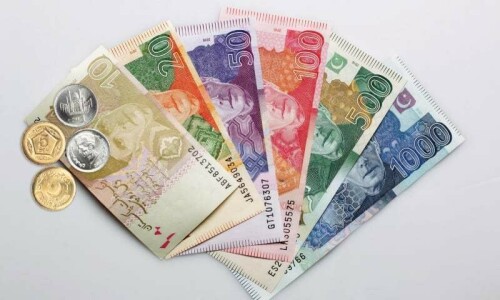KARACHI: The government’s borrowing from banks reached Rs4.7 trillion, with an addition of Rs700 billion within the last two months.
The State Bank of Pakistan’s (SBP) latest data showed that the government borrowed Rs4.69tr during July-March, marking record borrowings during the current financial year.
The huge borrowing has already sidelined the private sector, as the sector’s borrowing fell by 70 per cent, making it a hard time for economic growth.
Despite significant revenue collections, the record borrowing indicates excessive spending by the government without consideration for the cost of borrowing. The government is borrowing at record-high rates.
Analysts predict Rs7tr accumulation by June; advances to private sector plunge by 70pc
In the previous auction held on Wednesday, the government increased the six-month T-bills rate by 100 basis points to 21.39pc. Most of the borrowings have been made at the same rate during the fiscal year FY24.
The caretaker government had already set a record by borrowing Rs4tr, but the new government could not stop this borrowing trend. From Jan 19 to March 22, the government’s borrowings were Rs700bn.
In FY22 and FY23, total government borrowings from banks were Rs3.448tr and Rs3.716tr, respectively.
Some analysts believe that the current borrowing trend could lead to a total of around Rs6.5tr to Rs7tr by the end of June 2024. The government has been increasing energy prices to generate more revenue, but the borrowing from banks shows that the revenue being generated is not enough to meet the spending requirements.
The reckless borrowing has not only increased debt servicing, which accounts for almost 50pc of the budget outlay, but has also slashed public sector development funds (PSDP). The reduced spending for PSDP has slowed down economic growth.
The growth rate was negative in FY23, and the current trend indicates that growth could be similar to the previous year. The private sector has been relying on its own resources to continue at the minimum level, while domestic investment has decreased to an insignificant level.
The country’s economy has been experiencing the lowest growth in the region, with the highest inflation still around 27pc during the first nine months of the fiscal year FY24. Inflation has begun to decrease over the last three months, but the interest rate remains at 22pc, the main reason for extremely low private sector borrowings. Some experts were certain that the interest rate would see a significant cut in the next monetary policy scheduled at the end of this month.
The trade and industry have been urging for several months to lower the interest rate as it has made the cost of doing business too high. However, the central bank’s main target is inflation. In order to counter high inflation, the SBP has kept the interest rate unchanged at 22pc during FY24.
Published in Dawn, April 6th, 2024












































